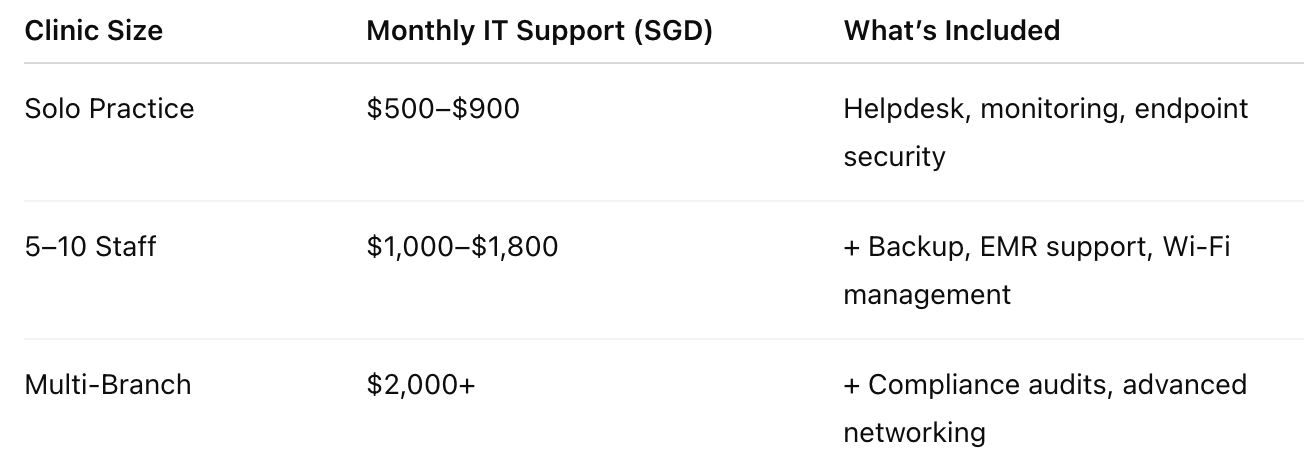How to Choose IT Support for Your Clinic
A Complete Guide for Healthcare, Dental & Aesthetic Practices in Singapore
In today’s digitally driven healthcare environment, choosing the right IT support provider isn’t just a technical decision, it’s a business-critical one.
From managing patient data to ensuring 24/7 uptime for EMR systems, your IT setup must be secure, scalable, and compliant with Singapore’s strict data protection laws (PDPA) and international healthcare standards like HIPAA.
So, how do you find IT support that meets your clinic’s unique needs?
In this guide, we break down the must-have criteria and red flags to avoid—plus actionable steps to assess and select the right IT partner.
Why Your Clinic Needs Specialized IT Support
Unlike typical offices, clinics manage:
Sensitive patient data governed by PDPA and potentially HIPAA (if serving U.S. patients)
Complex clinical software such as EMRs and digital imaging tools
High uptime demands, where even 10 minutes of downtime impacts patient flow
Cloud-based services and remote access for multi-site practices
📌 General IT companies may not understand clinical compliance requirements: putting your license, reputation, and patient trust at risk.
Key Factors to Consider When Choosing IT Support for Your Clinic
1. HIPAA/PDPA Compliance Expertise
Your IT partner must ensure your systems comply with:
PDPA (Personal Data Protection Act): Data handling, breach response, access control
HIPAA (Health Insurance Portability and Accountability Act): Encryption, audit logs, disaster recovery (if applicable)
Ask about:
Encryption protocols (for data at rest & in transit)
Multi-factor authentication (MFA) for EMRs and admin tools
Regular vulnerability assessments and policy audits
Breach reporting processes and incident response plans
Bonus: Providers with CSA Cyber Essentials/Trust Mark knowledge can help future-proof your compliance.
2. Endpoint & Device Management
From front-desk computers to treatment-room tablets, your endpoints must be:
Securely configured
Monitored for threats
Updated automatically
Compliant with access control policies
Look for providers offering:
Endpoint Detection & Response (EDR)
Remote patch management
USB & device access control
Antivirus + firewall suite with centralized dashboards
Tip: Insist on monthly device health reports and audit logs.
3. Data Backup & Disaster Recovery
No clinic can afford to lose access to patient records—even temporarily.
A quality IT support provider should offer:
Automated daily backups (cloud + encrypted local options)
Disaster recovery planning with tested restore procedures
Off-site data replication for fire, theft, or ransomware events
Recovery Time Objective (RTO) targets under 24 hours
Ask for quarterly restore test documentation and offsite location details.
4. EMR and Clinic Software Support
Your clinic may use tools like:
Plato, Guardian, EzEMRx, or proprietary EMR systems
X-ray/imaging software
Payment terminals and appointment platforms
Choose a provider that:
Has real-world experience supporting healthcare EMRs
Understands integration challenges (e.g., with lab or pharmacy systems)
Supports both desktop and web-based EMRs
Offers proactive availability for mission-critical issues
📌 Ask for client case studies in similar clinical environments.
5. Remote Access & Wi-Fi Management
Today’s clinics are hybrid and mobile; your IT provider must secure remote access without exposing your systems.
They should deploy:
Secure VPN or zero-trust remote access
Role-based access control (RBAC)
Wi-Fi segmentation (staff vs. guest networks)
Access point management to ensure full coverage in all rooms
Clinics with weak or shared Wi-Fi setups often face EMR lag, call drops, and compliance risks.
6. Helpdesk & Support Responsiveness
Issues happen—what matters is how quickly they’re resolved.
Look for:
SLA-backed response times (e.g., <1 hour for critical issues)
Helpdesk ticketing system with email and phone support
Local presence (on-site visits when needed)
After-hours or weekend coverage for 7-day clinics
Ask for performance metrics like average resolution time and first-call resolution rates.
8-Point Checklist: What to Ask Before You Sign
How Much Should You Budget for IT Support?
📌 Many providers offer bundled plans based on number of users and compliance needs.
Final Thoughts: IT Support That Grows with Your Clinic
Choosing IT support for your clinic is more than ticking boxes, it’s about building a trusted technology partner.
With the right provider, you’ll enjoy:
Higher patient satisfaction through fast, reliable systems
Lower operational risk and stronger data compliance
Confidence to scale your clinic with secure, cloud-first solutions
Don’t settle for reactive IT. Choose a provider that understands healthcare, speaks compliance, and delivers proactive support.
Need Help Choosing the Right IT Support?
We help clinics in Singapore:
Align IT systems with PDPA & EMR regulations
Secure endpoints, Wi-Fi, and cloud systems
Backup, monitor, and protect data with confidence
Provide fast, SLA-driven helpdesk support
👉 Book a Free Clinic IT Support Assessment




